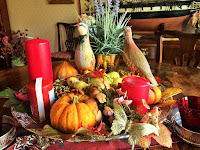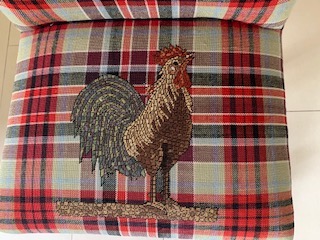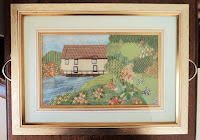Recent Holiday in Burma
As I have always admitted, travelling to new places meeting new people, enjoying their way of life and, in particular seeing their crafts is one of my greatest joys. Our trip to Myanmar, Burma that was until their independence in 1948, was no exception.
The people were so helpful to us and always had a smile; the countryside that we visited was green and lush with many lakes, the great Ayeyarwady River which acted as the main artery for transportation of goods and of course the magnificent temples all over the countryside but particularly in Bagan.
 Myanmar has borders with Thailand, China and India so the
food is a great mix of these cuisines, coupled with the extremely rich soil
that produces the most wonderful selection of both fruit and vegetables. I couldn’t resist a photo of a road side vegetable
stall, a vibrant cacophony of colour, smell and variety in a village we passed
through
Myanmar has borders with Thailand, China and India so the
food is a great mix of these cuisines, coupled with the extremely rich soil
that produces the most wonderful selection of both fruit and vegetables. I couldn’t resist a photo of a road side vegetable
stall, a vibrant cacophony of colour, smell and variety in a village we passed
through
However, as always I particularly love seeing the crafts
that are enjoyed by the people. Myanmar
is rich in natural resources, oil, timbre, jade and rubies to name a few and a
long established tradition in both embroidery and weaving.
 Our first trip to see some of the exquisite work was to a
village a short way outside Mandalay, Amarapura or the City of Immortality as
it was once know. Here we visited two
wonderful workshops, the first with women working on applique panels. The first photo shows the black ground fabric
stretched on a frame and the second various pre-embroidered motifs being
‘plunged’ onto the velvet with a profusion of seed pearls, sequins and bugle
beads (it could be said that they love a bit of bling!)
Our first trip to see some of the exquisite work was to a
village a short way outside Mandalay, Amarapura or the City of Immortality as
it was once know. Here we visited two
wonderful workshops, the first with women working on applique panels. The first photo shows the black ground fabric
stretched on a frame and the second various pre-embroidered motifs being
‘plunged’ onto the velvet with a profusion of seed pearls, sequins and bugle
beads (it could be said that they love a bit of bling!)  Of course here in Britain we have the same idea of mounting
fine needlepoint motifs onto a ground fabric – often for bed hangings. Mary Queen of Scots and Bess of Hardwick
worked together (in the late 15 hundreds)
on bed hangings known as the Marian Hangings with birds, animals and ciphers
some of which can still be seen at Oxburgh Hall in Norfolk and the Victoria
& Albert Museum in London^. A Google search will tell you more than I can
here.
Of course here in Britain we have the same idea of mounting
fine needlepoint motifs onto a ground fabric – often for bed hangings. Mary Queen of Scots and Bess of Hardwick
worked together (in the late 15 hundreds)
on bed hangings known as the Marian Hangings with birds, animals and ciphers
some of which can still be seen at Oxburgh Hall in Norfolk and the Victoria
& Albert Museum in London^. A Google search will tell you more than I can
here.More recently Sulgrave Manor has created new bed hangings for an original Elizabethan bed – an 8 year project with individual pieces worked in both the UK and the USA before being mounted on a ground fabric.
*With on going
conservation work it is wise to check with the destination before travel
 Our second visit in the same area was to a weaving group;
here we saw the wide looms that create the national dress, the longyi; A flat panel 2m wide and 1 ½ m long that both
men and women wear (they tie them slightly differently) Those we saw were silk
and absolutely the top end of the market, items that would be worn for very
special occasions. This one, with two
girls sitting side by side at the loom would take about a full month to
complete. Here too is a general view of
the workshop and two photos of the silk store that I had to capture!
Our second visit in the same area was to a weaving group;
here we saw the wide looms that create the national dress, the longyi; A flat panel 2m wide and 1 ½ m long that both
men and women wear (they tie them slightly differently) Those we saw were silk
and absolutely the top end of the market, items that would be worn for very
special occasions. This one, with two
girls sitting side by side at the loom would take about a full month to
complete. Here too is a general view of
the workshop and two photos of the silk store that I had to capture!
 Never before had I seen the fibres extracted from the stems
of the lotus plant and then either woven alone, very very expensive or mixed
with silk, still expensive but not quite so much!
Never before had I seen the fibres extracted from the stems
of the lotus plant and then either woven alone, very very expensive or mixed
with silk, still expensive but not quite so much!The lotus fibres are always left a natural cream colour but the silks are dyed and I photographed the dye vats for you to see!
 Again the weaving atelier we visited, Ko Than Hlaing, has a
charming and informative web site with good illustrations.
Again the weaving atelier we visited, Ko Than Hlaing, has a
charming and informative web site with good illustrations.My meagre purchases were a vibrant pink hand-woven cotton for the back of my ‘S’ cushion I shared on my last blog ‘Tips for Travelling’ and a scarf that I shall both enjoy wearing and matching up with threads for a future needlepoint project.



Comments
Post a Comment